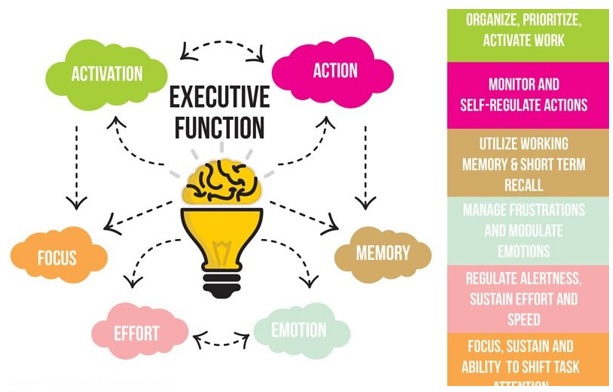In the dynamic environment of a classroom, executive function skills are one of the fundamental skills for student success. These self-regulating skills include the ability to focus, ignore distractions, and switch tasks efficiently. They play a significant role in learning, behaviour, and overall development. However, not all students naturally excel in these areas.
Some may find it challenging to manage impulses or retain information. As such, educators have a vital role in providing the necessary support to help these students enhance their executive functioning. Those educators who have pursued courses like Educational Administration and Management Courses in Bangalore, know it really well.
However, if you are also curious about how you can help your students develop and improve their executive function skills, then we have got you covered.
In this blog post, we will get to know, some of the most effective strategies to support students to develop their executive function skills that help them to achieve academic success and personal development.
Before you move to the topic, can we ask you a quick question? Do you follow us on Social Media? If not, then you’re missing out on a lot of informative content. We regularly share upgraded educational content, tips, feedback, and more. Check us out by clicking the profiles here - Facebook / Twitter / LinkedIn / Pinterest / Instagram / YouTube
Educating Students About Executive Function

Source: bridge-tutoring.com
Educating students about executive function is essential in helping them recognize and understand how these skills influence their everyday actions. These self-regulating abilities are akin to muscles that require regular exercise to strengthen. By introducing the concept of executive function in the classroom, students can start seeing these skills as something they can improve over time.
It’s beneficial to create discussions around personal experiences with task procrastination or ineffective planning. Through these exchanges, students gain insight into common challenges and learn the significance of prioritizing these abilities to enhance their overall performance.
Effective Strategies For Supporting Executive Function In The Classroom
Let’s get to know some of the effective strategies for setting up supportive classrooms for executive functions skills:
Encouraging Self-Reflection
Self-reflection plays a crucial role in fostering executive function skills. During classroom activities or lessons, encourage students to pause and consider what factors might have distracted them. This process of stopping and reflecting allows students to pinpoint causes of distraction and develop strategies to improve focus and task completion.
By engaging in regular self-reflection, students become more aware of their strengths and areas needing improvement, empowering them to make proactive changes in their behavior and approach to learning.
Creating a Structured Environment
Establishing predictable routines within the classroom is vital for students struggling with executive function. A consistent schedule provides a comforting framework for students, minimizing feelings of chaos and uncertainty. When students are aware of what to expect and what is expected of them, they can focus more effectively on the tasks at hand.
Incorporating visual schedules and clearly defined rules ensures that students are reminded of daily procedures, which aids in reducing anxiety and enhancing their ability to concentrate on learning.
Organizing the Classroom to Minimize Distractions
The physical layout of the classroom significantly impacts students' ability to focus and learn. By organizing the classroom to minimize distractions, teachers can create an optimal learning environment that promotes attention and reduces stress. Consider positioning desks away from windows or high-traffic areas to cut down on external distractions.
Maintaining a tidy and clutter-free space also contributes to better concentration and smoother transitions between activities. By orchestrating an environment that limits interruptions, students are better equipped to engage with their learning material more effectively.
Breaking Down Tasks with Checklists
Checklists serve as an invaluable tool in aiding students to break down larger tasks into smaller, more manageable parts. For students struggling with executive function skills, tackling a complex project can feel overwhelming. A checklist minimizes this anxiety by providing clear, sequential steps, making tasks appear more achievable.
By crossing off each completed task, students not only maintain focus but also build confidence as they see tangible progress. Thus, using checklists in the classroom promotes a structured approach to assignments, helping students better manage their tasks.
Enhancing Memory with Planners
Planners are essential for boosting memory capabilities among students with executive function challenges. These tools help students keep track of homework, tests, and upcoming assignments, serving as a visual reminder to prompt them about what needs attention. By consistently using a planner, students develop a habit of organization that extends beyond the classroom. Whether in digital or paper format, planners empower students to take responsibility for their learning, ensuring they stay on top of their academic commitments and deadlines.
Modeling Executive Function Skills
Modeling is a powerful instructional strategy that educators can utilize to demonstrate real-life applications of executive function skills. By sharing their own thought processes, teachers can illustrate how they approach planning and problem-solving.
For instance, walking students through the steps of planning a lesson or resolving a conflict showcases the practical application of these skills. Students benefit from observing these demonstrations, as it provides them with concrete examples that they can emulate in their own lives, enhancing their problem-solving and planning capabilities.
Handling Classroom Interruptions Calmly
Classrooms are dynamic environments where interruptions are inevitable. Demonstrating how to handle such interruptions with composure models effective emotional regulation and adaptability for students. When teachers address disruptions calmly, they convey the importance of staying focused and adaptable.
Through this modeling, students learn how to maintain their concentration and adjust to unforeseen changes without stress. This skill is crucial for developing resilience and maintaining productivity, equipping students to navigate the unpredictability of everyday life.
Integrating Technology for Support
In today's digital age, technology can greatly assist students in managing their workload, especially those who struggle with time management and organizational skills. Digital tools offer innovative ways to support executive function by providing frameworks for better organization and task management. For instance, digital calendars can help students keep track of assignments, tests, and project deadlines. Reminder apps serve as virtual prompts, ensuring that important tasks are not forgotten.
These tools help students break down larger tasks into smaller, more manageable chunks, reducing the feeling of being overwhelmed. By effectively planning their schedules digitally, students can improve their productivity and have more control over their academic duties.
Utilizing Task Management Apps
Task management apps are another technological resource that can bolster students' executive function skills. These apps often include features like to-do lists, priority-setting, and progress tracking, which can support students in organizing their schoolwork.
For students who face challenges with executive functions such as memory or task-switching, these apps provide structured ways to visualize tasks, set timely reminders, and prioritize effectively. By using such applications, students can foster independence and accountability in managing their workload, ultimately leading to enhanced student success.
Incorporating Physical Activities
Physical activity is not just beneficial for physical health; it also plays a significant role in enhancing cognitive functions, including executive function. Aerobic fitness, in particular, has been linked to an improvement in brain functions due to the increase in blood flow to the brain, which contributes to better connectivity in white matter.
Research indicates that students who regularly engage in aerobic activities like jogging, cycling, or swimming tend to exhibit greater cognitive flexibility, improved problem-solving skills, and enhanced memory retention. By integrating regular physical exercise into the school routine, educators can help students bolster their executive function capacity.
Incorporate Mindful Practices
Mindfulness practices, such as meditation and mindful breathing, are increasingly recognized for their benefits in improving executive function skills. Engaging in mindfulness activities helps students to develop better focus, reduces anxiety, and enhances memory. These practices enable students to pause and reflect before reacting, thereby improving impulse control.
By incorporating mindfulness exercises into the classroom, teachers can help students practice self-regulation techniques that promote calmness and concentration. Ultimately, this leads to better academic performance and improves students' ability to manage stress and distractions.
Evaluating Specific Development Areas
To effectively support students' executive function in the classroom, it is crucial to first evaluate their specific developmental areas. Not all students will have the same strengths and weaknesses in executive function skills, such as working memory, impulse control, or attention. Therefore, conducting a thorough assessment with the help of school psychologists or specialized professionals can pinpoint the areas where a student may need additional support.
These evaluations may include observing the student's behaviour, reviewing their academic performance, and gathering insights from teachers and parents. By understanding each child's unique needs, educators can develop a targeted approach to help them improve their executive skills.
Fostering Growth Beyond the Classroom
Supporting executive function skills in the classroom goes beyond academics, equipping students with essential life skills that will benefit them throughout their educational journey and beyond. By implementing structured routines and fostering an environment where students can learn to prioritize and organize, educators provide a foundation for lifelong growth.
If you want to learn more effective ways to support your students to not just develop academic skills but life skills also. Then, you must consider pursuing courses like Educational Administration and Management Courses in Bangalore, where you will get to learn from top expert trainers.
We believe education should be accessible for everyone. That’s why we don’t charge for our blogs. Find the right course that will help you in your career with us, contact us at - 1800–212–6400. You can mail us at act@asiancollegeofteachers.com.
Written By : Abhishek
